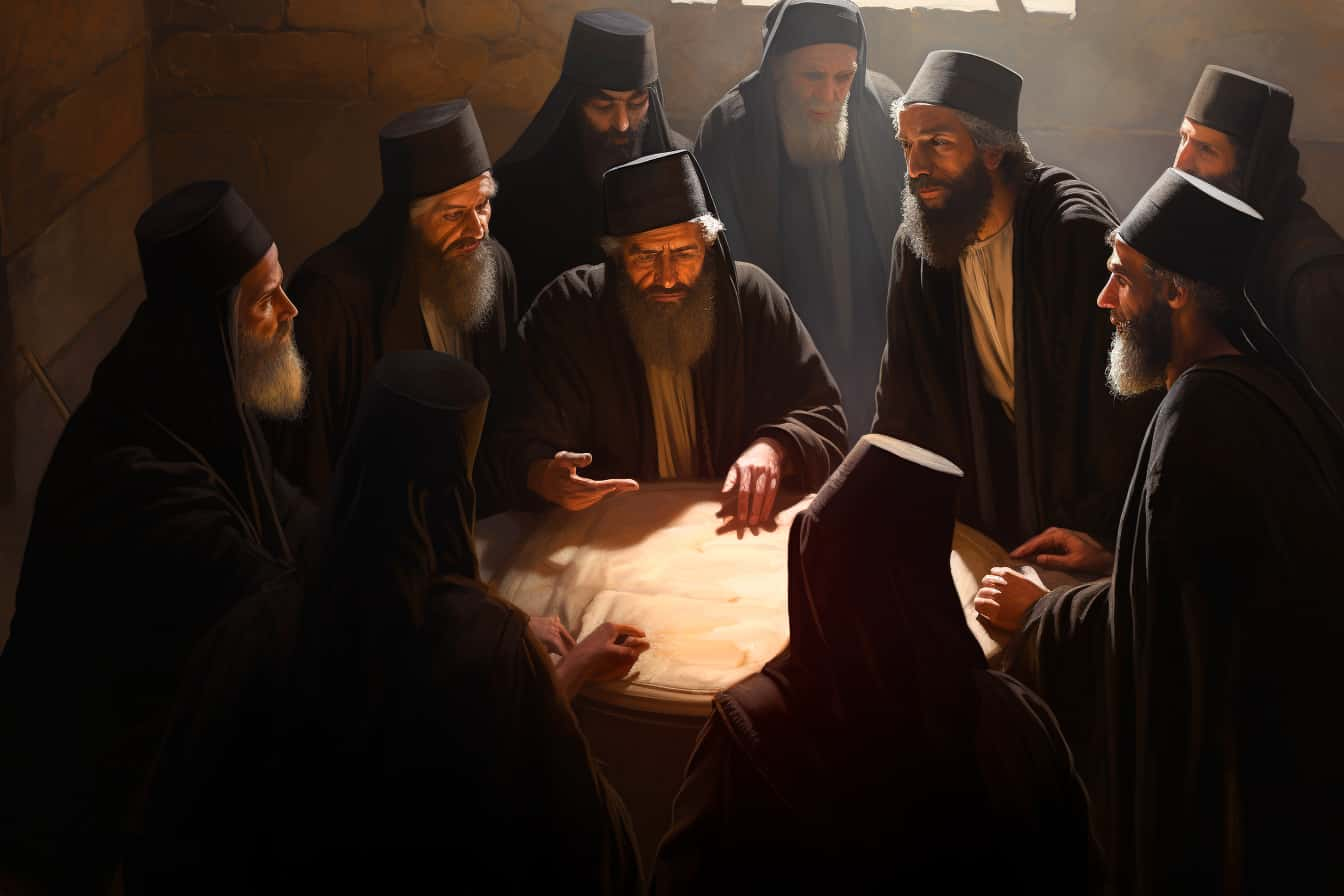Discover Jesus \ Events \Final Decision of the Sanhedrin
Tag
Final Decision of the Sanhedrin
The Sanhedrin unanimously voted to sentence Jesus and Lazarus to death. This decision followed Jesus' severe critique of Jewish authorities in his last temple speech. They planned to arrest him discreetly, at night.

Table of Contents
Summary
On Tuesday, April 4, 30 CE, a meeting of the Sanhedrin, the supreme court of the Jewish nation, was held to determine the fate of Jesus. There had been many other meetings in which Jesus was discussed, but this meeting was different from any other such meeting. At this meeting, the Sanhedrin voted finally, officially, and unanimously to decree a sentence of death on Jesus and Lazarus. The meeting came soon after Jesus’ fiery denunciation of the Jewish rulers in his last temple discourse, and this was their resentful answer to his withering public indictment of them and the Pharisees.
This decision effectively nullified the ancient covenant of Melchizedek with Abraham, which promised the Jews that they would be the bearers of light to earth if they believed in God and followed his guidance.
The order was issued to apprehend the Master, but not in public, and preferably under cover of darkness.
The Fateful Meeting of the Sanhedrin Court
When Jesus delivered his final denunciation of the Jewish rulers in his last temple discourse on Tuesday morning, April 4, 30 CE, his scathing words inflamed the anger of these rulers. However, it was not only a denunciation of these rulers; Jesus also extended a gracious hand of mercy to the Jews, which they could have accepted.
That evening, a meeting of the Sanhedrin was held, during which this supreme court of the Jewish nation decreed a death sentence on Jesus and Lazarus. There had not even been a trial yet, but this death sentence was the angry reaction of these rulers to Jesus’ severe indictment of them and a resounding rejection of his offer of mercy.
Many times had this court met to denounce Jesus; many times had they decreed his death; many times they vowed to put an end to his ministry; these previous attempts to stop Jesus had always been informal and not official. But at this meeting, they finally, officially, and unanimously voted to place Jesus under arrest and to execute him.
These rulers feared Jesus and his popularity among the common people. His cleansing of the temple on the morning of Monday, April 3, threatened their revenues, and they thought of themselves as responsible for maintaining social order. Jesus’ teachings of the gospel kingdom and the brotherhood of all mankind threatened their religious supremacy, and they believed it needed to be stopped at all costs.
This official decree of death upon Jesus was, in effect, the final rejection of the Son of God by the Hebrew nation. A millennium before, a covenant had been made between Melchizedek and Abraham, assuring Abraham that if he believed in God and obeyed his guidance, the children of Abraham would become the bearers of truth to the world. This divine covenant was now invalidated.
The Aftermath
The order went out that Jesus was to be arrested the next day but out of sight of the general populace. The officers of the Sanhedrin were instructed to apprehend the Master in secret, by surprise, and under cover of darkness. He was to be delivered "before the high Jewish court sometime before midnight on Thursday."
Assisted by the treachery of Judas Iscariot, Jesus was arrested late Thursday night in the garden of Gethsemane. Early Friday morning, he was brought to the court of Pontius Pilate in order that the decree of death could be confirmed and sanctioned by the Roman authorities.
The clerk of the Sanhedrist court said to Pilate: "It is not lawful for us to put any man to death, and this disturber of our nation is worthy to die for the things which he has said and done. Therefore have we come before you for confirmation of this decree."
This irregular but formal trial before Pilate did, in fact, end up serving as that confirmation. Jesus was arrested without an arraignment, accused without evidence, judged without witnesses, punished without a verdict, and now was condemned to die by an unjust judge. When Pilate, who personally found no guilt in Jesus, washed his hands of responsibility, the multitudes cried: "His blood be on us and on our children!"
Suggested Reading from this Essay

Related People
Jesus
Son of God, Son of Man. Creator Son of the Universe.
The Twelve Apostles
The chosen followers of Jesus.
Sanhedrin
The Jewish ruling council that largely opposed Jesus.
Related Topics
Priesthood in the Times of Jesus
Religious leaders opposed Jesus' message in ancient Palestine.
Related Locations
Jerusalem
Center of many pivotal moments in Jesus’ life.
Contributors
MaryJo Garascia, Mike Robinson, Gary Tonge
